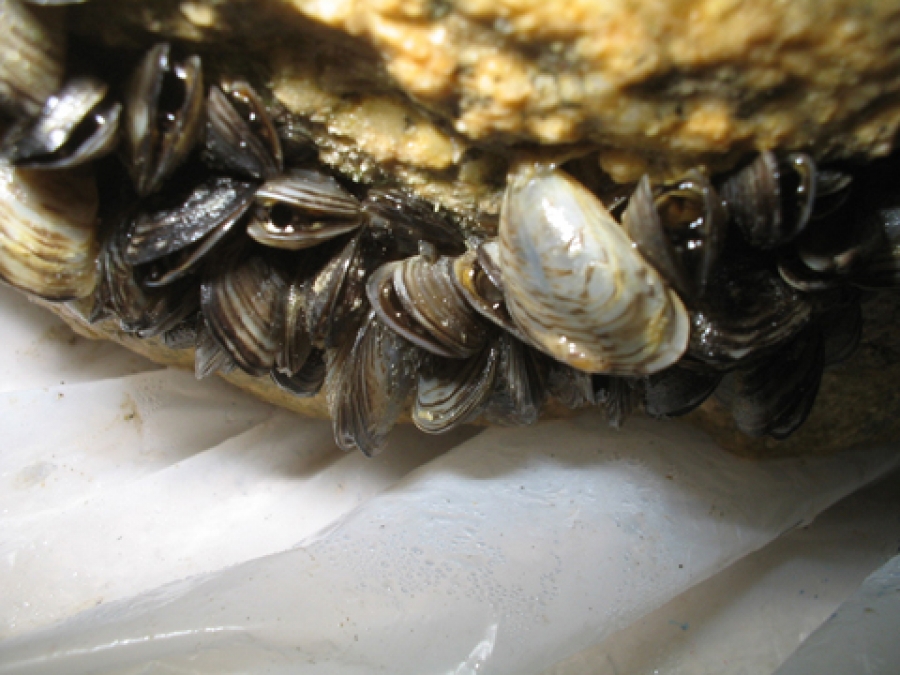Elevate your local knowledge
Sign up for the iNFOnews newsletter today!

THOMPSON-OKANAGAN – The defensive war on invasive mussels hitching a ride into British Columbia’s lakes and rivers via recreational boats has just begun but there’s already talk of opening up a new front — float planes.
While recreational boats and commercial boat haulers are the primary target of the recently-launched Don’t Move A Mussel educational program, some in the water protection sector are sounding the alarm about a possible airborne attack from freshwater quagga and zebra mussels.
“At almost every board meeting where we talk about mussel prevention programs, one of the elected officials will ask about float planes, so there is an awareness of a potential problem,” Okanagan Basin Water Board executive director Anna Warwick Sears says. “I think it needs to be looked at.”
Dave Stein, a float plane pilot with Air Hart, a local tour and pilot training facility, dismisses as very low the chances of contamination occurring from of a float plane because of the high speeds involved in take-off.
"As far as I know, the studies from the Federal Aviation Administration of float planes show the risk of transfering mussels between bodies of water is negligible. When we take off from a weedy lake, we cycle our gear and everything falls off. I dont think they are worried about us picking up the mussels because they are coming off in the hundred-mile-an-hour wind during take-off,” Stein says.
"The only way is if some guy has his plane parked the plane in the water for a month and has a good crop of them on the floats and for some reason, maybe there’s a couple stuck on the back of the floats or something, but as far as I know they are not too concerned about us," he says.
While recreational boats are far more numerous than float planes on both sides of the Canada-U.S. border, Warwick Sears says the problem lies with the mussels themselves because just one mature female mussel can produce one million eggs in a season.
The highly destructive mussels, which like to attach themselves to any submerged hard surface, were originally introduced into North America from Europe in the 1980s. They are an ongoing problem in parts of eastern Canada where they have been found as far west as Lake Winnipeg.

In the U.S., both types of mussels are firmly established in the east and south-west, where they have affected lakes in Arizona, Nevada and southern California, but have so far not been found north of there.
While still hypothetical, the biggest concern lies with a recreational float plane pilots wintering in the south and then lake-hopping up to B.C.
“All it would take is one contaminated float plane to make its way into B.C. waters and the damage is done,” she adds. “I think we need to reach out to the float plane community with some education. That’s part of our plan for the coming year.”
A request for an interview with the B.C. Float Plane Association did not receive a reply.
While the provincial government also downplays the risk, David Karn, a media relations officer with the B.C. Ministry of Environment, issued this statement:
"Floatplanes have the potential to move aquatic invasive species between waterbodies, in particular floating aquatic vegetation and mussels and snails that might attach to them. Another concern is residual waters in the floats that might contain juvenile invasive species. However, as the provincial mussel defense program is ramping up this year, our initial focus will be recreational and commercially hauled boats. Educating the float plane community is a next step in rolling out this program, as we consider them a lower risk pathway for the introduction of mussels than boats."
B.C. is a member of the Columbia River Basin zebra and quagga mussel team, which has produced an educational video on how to decontaminate float planes, which in itself shows the extent of the problem down south, Karn says in the statement.
“The question is how to communicate that concern here,” Warwick Sears says. “What we want to see is an awareness in everybody who is moving from lake to lake, not just float plane pilots or boaters. We want to reinforce the idea of individual respect for our lakes and rivers because once mussels are established, they are next to impossible to erradicate."
To contact the reporter for this story, email John McDonald at jmcdonald@infonews.ca or call 250-808-0143. To contact the editor, email mjones@infonews.ca or call 250-718-2724.
Want to share your thoughts, add context, or connect with others in your community?
You must be logged in to post a comment.